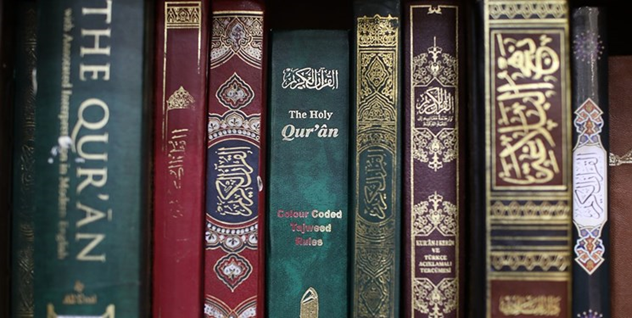Download and read the free sample file of the first 23 pages of this valuable work here
Why should I study Tafsir al-Mizan (Volume 1 - Surah Hamd)?
To buy from Inside of Iran, see here
why we need to read holy Quran and the criterion interpretations about that?
what kind of benefits are embed in reading holy Quran and the criterion interpretations about that?
what is the brilliant specifications about style of holy Quran and the criterion interpretations about that?
how can holy Quran and the criterion interpretations about that help human to have a better life?
why should we buy and study holy Quran and the criterion interpretations about that?

we need to study the sources of interpretation to understand them correctly
The Holy Quran is considered by Muslims to be the word of God, revealed to the Prophet Muhammad. Reading the Quran and studying its interpretations can have several benefits for individuals.
Firstly, it provides guidance and wisdom on various aspects of life. The Quran covers a wide range of topics, including belief, morality, social interactions, family matters, and guidance for personal development. By studying its teachings, individuals can gain a deeper understanding of how to live a virtuous and fulfilling life.
Secondly, reading the Quran and its interpretations can help deepen one's spirituality. It serves as a source of inspiration, bringing peace and tranquility to the hearts of believers. Through reflection and contemplation on its verses, individuals can strengthen their faith and connection with God.
The style of the Quran is unique and often described as eloquent and literary. Its verses are filled with poetic beauty, rhythmic prose, and profound metaphors. This literary excellence adds to the appeal of the Quran and has made it a subject of study for linguists and literary scholars throughout history.
Moreover, studying the interpretations of the Quran can help individuals understand its messages in a contemporary context. Scholars and experts provide insights and explanations about the verses, considering the historical context and applying them to current circumstances. This enables individuals to apply the Quran's teachings in their daily lives and make informed decisions.
Lastly, studying the Quran and its interpretations can help promote a better life by encouraging ethical behavior, justice, and compassion towards others. It teaches principles such as honesty, forgiveness, kindness, and charity, which contribute to building a harmonious society.
Regarding purchasing the Quran and its interpretations, it is a personal choice. Many people prefer having a physical copy for ease of reference and personal study. But there are also digital versions and online resources available for those who prefer a digital format. Ultimately, the objective is to engage with the Quran in a way that benefits one's personal growth and spiritual development.
Introduction
The Almighty God, by being completely surrounded by the human nature and the needs that man has, by sending religious books and prophets, has reminded him of the creation of man from the pure gem. Therefore, it is necessary that with any kind of religious thought and level of knowledge, while referring to religious sources, they benefit from the knowledge and guidance available in it.
Use of authentic interpretive sources

Interpretation of religious books
Human need to use religious books

Authentic sources of commentary
conclusion
Allameh Seyyed Mohammad Hossein Qazi Tabatabai Tabrizi (born in Tabriz 1281 - died on November 24, 1360 Qom) known as Allameh Tabatabai, was a famous cleric, a great philosopher and a hard-working and deep-thinking Iranian writer; He was one of the great Shia taqlid authorities and one of the famous teachers of the religious schools in Qom. His childhood and adolescence were spent in Tabriz. He lost his mother at the age of five and his father at the age of nine. His father's executor sent him and his only brother Mohammad Hassan Elahi Tabatabai to school. He studied the Qur'an and Persian literary books in elementary school, then studied religious sciences.
In addition to learning literature, he learned calligraphy techniques under the supervision of calligrapher Mirza Alinqi. Elementary education could not respond to his rich taste and abundant interest, so he went to Talebiyah School in Tabriz and studied Arabic literature, translation sciences, jurisprudence and principles and studied various fields of Islamic knowledge. He himself remembers his studies as follows: "At the beginning of my studies, when I was only employed, I was not very interested in continuing my studies, and therefore I did not understand everything I was studying, and I spent four years like this. After that, God's providence suddenly surrounded me, changed me, and I felt a kind of fascination and impatience towards studying for perfection. So that from that day until the end of my studies, which lasted for almost seventeen years, I never felt tired or discouraged about education and thinking, and I forgot the ugly and beautiful of the world and considered the bitter and sweet events as equal. I completely dismantled non-academic society. I was satisfied with the minimum necessary of food and sleep and other necessities. I studied all the time. Especially in the spring and summer, when I spent the night studying until the sunrise, and I always studied tomorrow's lesson the night before, and if there was a problem, I would solve it with every effort, and when I attended the lesson From what the teacher said, I was already clear and I never brought the problems and mistakes of the lesson to the teacher."
He also went to Najaf with his brother and studied religious sciences in Najaf for ten years. During this period, he learned mathematics from Seyyed Abulqasem Mousavi Khansari, the grandson of Seyyed Abulqasem Khansari, and learned jurisprudence and principles from professors such as Mohammad Hossein Naini and Mohammad Hossein Gharavi Isfahani. His teacher in philosophy was Hakim Mutala, Seyyed Hossein Badkobei. He also studied theology, interpretation of the Qur'an to the Qur'an, wisdom and philosophy, mysticism, ethics and hadith jurisprudence from Seyyed Ali Qazi Tabatabai. While he was studying in Najaf, he was forced to return to Iran due to the scarcity of livelihood and the lack of income from his agricultural property in Tabriz, and for ten years after that, he worked in agriculture in the Shadabad village of Tabriz. then he was spending his time with agriculture for making money.
About this period of the fruitful life of this great master of religion and Islamic sciences, his son Seyyed Abdul Baqi Tabatabai says: "I remember well that my father was constantly busy with farm throughout the year. He was working also in the cold season and his hard working during the rain and seasonal snows, while holding umbrellas or wearing skins, was considered normal.

Many people prefer having a physical copy for ease of reference and personal study
Lack of ambiguity and exaggeration in the meanings of the verses and the origin of differences
Among all the verses of the Qur'an (which are more than several thousand verses), we do not find a single verse that is exaggerated and superstitious in its meaning, so that the reader's mind gets confused and confused in understanding its meaning, and how could it not be so and However, the Qur'an is the most eloquent Arabic language, and the most basic condition of eloquence is that it does not have any obfuscation or superstition, and even those verses that are considered to be similar to the Qur'an, such as the abrogated verses and the like, are very clear in their meaning. And it is clear and its similarity is due to the fact that we do not know what it means, not because the meaning of its appearance is unknown. Therefore, this difference is not found in the meaning of the words, but all of them are found in the difference in the example of the words, and each religion and profession have taken the words and sentences of the Qur'an to an example, which the other does not accept. From the imaginary and affirmative signification of the word, one thing is understood and the other is something else.
The reason for the material meanings of the words imposed on the mind
The explanation that human nature and habit (just as it has been said) causes the mind of a person to overtake its material meaning when hearing a word or a sentence, and before any other meaning, that material meaning or its adjuncts The mind comes, and we humans, from the place where our bodies and our physical powers, as long as we are in this material world, are immersed in matter, and it is all about matter, so for example, if the word life, and science, And when we hear power, hearing, sight, speech, will, satisfaction, anger, creation, order, and the like, the material meaning of these immediately comes to our mind, the same meaning that comes from We know these words in ourselves. And also when we hear the words heaven, and earth, and tablet, and pen, and throne, and seat, and angel, and angel's wings, and Satan, and his troops, from his infantry and cavalry, natural and material examples. It overtakes our mind, and enters our understanding before any other meaning.
Dear Visitor; Please take a look at the list of 50 most visited websites in the world wide web: YouTube, Facebook, google, translate, gmail, weather, amazon, Instagram, cricbuzz, Hotmail, wordle, satta king, twitter, yahoo, yandex, sarkari result, Netflix, google maps, yahoo mail, roblox, whatsapp, NBA, BBC news, outlook, pinterest, flipkart, eBay, omegle, live score, tiktok, canva, ipl, premier league, hava durumu, ibomma, walmart, twitch, ikea, shein, linkedin, home depot, e devlet, lottery, snaptik, cricket, serie a, nfl, spotify, fox news, amazon prime; There is no book publishing related or project management website in this list. We are working hard to bring these important issues to the center of concentration of societies. Please introduce us via social media, share our website with others and help us to make our world a better place to live. Best Regards.
Write your opinion